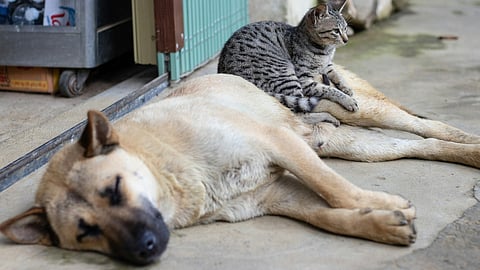
- NEWS
- the EDIT
- COMMENTARY
- BUSINESS
- LIFE
- SHOW
- ACTION
- GLOBAL GOALS
- SNAPS
- DYARYO TIRADA
- MORE

In a bid to address the rabies issue in the Philippines, veterinarians urged the public to spay and neuter their pets.
According to the Philippine Animal Welfare Society (PAWS), spay refers to the removal of the ovaries of a female animal. At the same time, neuter means the removal of the testicles of a male animal.
Castrating pets reduces the tendency of dogs and cats to roam outdoors and be exposed to harm, as well as it also reduces the number of unwanted pets and homeless animals.
"Napakaimportante nun kasi nga hindi na magro-roam yung animals (This is very important because this would reduce the chance of animals from roaming in the streets)," Philippine Animal Hospital Association President Mitzi Padrinao told DAILY TRIBUNE.
Padrinao explained that castration also reduces the risk of transmitting zoonotic diseases like rabies to humans.
"For example, yung dog, na-castrate mo, hindi na siya maghu-hunt ng female dogs. Wala nang effects sa kanya yung pheromones ng female dogs na nireregla (If you castrate a male dog, he will never hunt a female dog again. Pheromones from female dogs will have no effects to him)," she continued.
"Same as female, hindi na yan maghahanap ng male (Same as the female dog, she will never hunt for a male partner again once she gets castrated)," she added.
Spaying and neutering also reduce the chances of breast cancer and pyometra for females; prevent testicular cancer for males; and reduce chances of dog fights and catfights among males.
Meanwhile, for the Philippine Veterinary Medical Association (PVMA)'s part, its president said the organization continues to train veterinarians in rural areas across the country to train them to do proper castration.
"Sa buong Pilipinas, sa Luzon, Visayas, at Mindanao napupuntahan na namin yung halos lahat ng probinsya ng bansa natin. Isinusulong natin na maintindihan nila yung ginagawa ng PVMA sa pamamagitan ng pagtuturo ng technique sa pagkakapon (Throughout the Philippines, in Luzon, Visayas, and Mindanao, we have visited almost all the provinces of our country. We are promoting that they understand what PVMA is doing by teaching the technique of castrating)," PVMA president, Dr. Harris Constantino, told DAILY TRIBUNE.
"Sa lahat ng beterinaryo sa remote areas ay matutuhan nila at magkaroon sila ng confidence na matuto sila sa mga programa patungkol sa pagkakapon (To all veterinarians in remote areas, they will learn more and have the confidence to learn from programs regarding castration)," Constantino added.
He explained that the PVMA wants to break the common misconception in the province that veterinarians just administer vaccine shots to dogs, cats, and other cattle animals.
"Ang pagkakaalam lang kasi ng mga mamamayan sa beterinaryo ay puro lang injection (The only thing people know about veterinarians are they are just giving injections)," he added.
"Ngayon tumaas ang repopulation ng companion animals, dumami pa lalo yung mga nag-aalaga pa ng aso't pusa. Mas mataas ngayon yung contact na may posibilidad na magkakaroon ng rabies ang ating mga kababayan (But now, the repopulation of companion animals has increased, the number of those who are still taking care of dogs and cats has increased. The contact with the possibility of rabies among our countrymen is higher now)."
That's why, he furthered, they are prioritizing the depopulation program.
